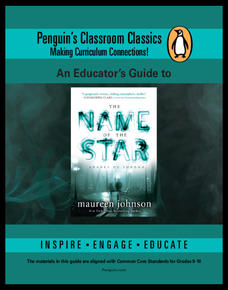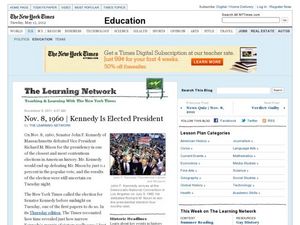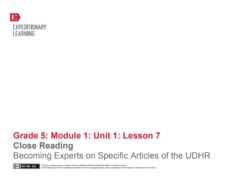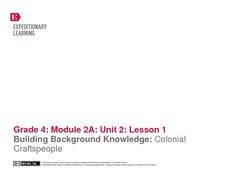Curated OER
Of Human Bondage
How does the particular point of view in a situation affect the way it is presented? Focusing on perspectives on slavery during the Civil War, middle schoolers use research to write narratives from the points of view of their historical...
Penguin Books
An Educator's Guide to The Name of the Star by Maureen Johnson
Jack the Ripper terrorized London in the late 1800s. An educator's guide for the novel The Name of the Star places the historical figure in a modern context. Readers complete a pre-reading activity before answering a series of discussion...
Curated OER
Nov. 17, 1973 | Nixon Declares 'I Am Not a Crook'
Connect events of the past to events of today. Budding historians read an eight paragraph passage describing the Watergate scandal. They then connect the Nixon scandal to sex scandals of recent times. There are six critical thinking...
Curated OER
I Am Seventeen Going On ?
Students explore the differences between going through adolescence in New York City in 1980 and today by reading and discussing the article, "When He Was Seventeen." They write a script for a podcast about the teen/parent relationship...
Curated OER
New York City: Passionate About Shakespeare
Students read passages from Shakespeare and have a Town Hall meeting in which they defend Shakespeare as part of American culture.
Curated OER
Investigating History with Kidd Gloves
Students act as historical archeologists and use their analytical skills to deduce, from lists of items related to historic figures, accurate details about the lives of those people.
Curated OER
Nov. 8, 1960 | Kennedy Is Elected President
Using the presidential election of 1960 as background information, learners consider the push of electoral reform. They read about the events and issues surrounding President Kennedy's win in 1960 and compare them to the same issues...
Curated OER
Modernism: American Literature 1914-1945
What characterizes modern literature? The first few slides of this 31-slide PowerPoint discuss what sparked the change to Modernism and discuss some of the key figures of the time (like Karl Marx and Sigmund Freud). The 20s and 30s are...
Library of Congress
The Harlem Renaissance
The Harlem Renaissance brought forth many American art forms including jazz, and the writings of Zora Neale Hurston and Langston Hughes. Using a carefully curated set of documents from the Library of Congress, pupils see the cultural...
Middle Tennessee State University
Who's Afraid of the Big Bad Wolf? A Comparison in American Culture
As part of their study of the Progressive Era, class groups examine a 20th century version of "The Three Little Pigs" through a New Era lens and identify how ideals such as the value of hard work, creativity, and problem solving,...
Curated OER
American History Through the Len of the Supreme Court Decisions
Students examine the historical background of Supreme Court decisions and the basic principles behind legislation. As part of the lesson, students discover legal concepts and terms and write sentences using the vocabulary they have...
Curated OER
Breaking the Chains, Rising Out of Circumstances
Discuss the history of slavery by analyzing historic photography depicting slavery. Learners write fictional stories based on these photographs. This is a creative and motivating way to launch a discussion of these topics.
Curated OER
Winter Wonderland - Winter Olympics and the Water Cycle
After a concise introduction to the water cycle, junior meteorologists access NOAA's average snowfall data. They choose a city to examine in terms of precipitation. Then they look at historical snowfall data and use it to predict snow...
EngageNY
Close Reading: Becoming Experts on Specific Articles of the UDHR
A continuation of the previous instructional activity, which is part of a larger group of lessons on human rights (see additional materials). Here, in Lesson 7, your class will explore more articles from the Universal Declaration of...
Center for History Education
Women's Rights in the American Century
Today, many young people find it hard to understand why it took over 150 years for women in the United States to get the right to vote—why there was even a need for the suffrage movement. As they read a series of primary source...
Curated OER
Living to Tell Their Tales
Students explore ways in which the elderly can be valuable resources in learning about history. By conducting their own historical research through interviews with the elderly, students come to appreciate this resource first-hand.
Curated OER
If a Picture's Worth a Thousand Words...
Students examine the debate between the preservation of and access to historical artifacts. They explore the notion of ownership and commodification of historical artifacts and come up with a plan for compromise.
Curated OER
From Formal To Slang
Tenth graders define the term slang, explaining its various social, historical, and racial contexts, so as to articulate when it can be appropriately used as a means of effective communication. They use their own personal slang lexicon,...
Scholastic
The Rise of Railroads: Illinois
Railways not only cross the US, but they are also intertwined with the history of America. Using a timeline format, individuals explore the connections between major events in American history—such as the Civil War—and the rise of the...
Curated OER
The Great Depression
Pupils examine the time period of the Great Depression. In groups, they discover how the Works Progress Administration helped many workers during this time. Using the internet, they research how the government focused on the arts and...
EngageNY
Documenting Research: Sorting and Recording Information About the Wheelwright
Fourth graders practice using a graphic organizer to record their notes and answer text-dependent questions while supplying evidence of how they found their answer. They focus on a machine called the wheelright, which was commonly...
EngageNY
Building Background Knowledge: Colonial Craftspeople
In the first lesson plan of this unit on colonial trade, fourth graders gain background knowledge of different jobs performed by early colonists. The class begins with a slide show presentation that includes a variety of great...
EngageNY
Synthesizing Research: How Colonists Were Interdependent
Following the formative assessment of this unit, young scholars present the information they gathered on their specific colonial trade to the rest of the class. Working in groups, learners create posters describing the particular job...
Curated OER
Winter Olympics History Year by Year
Investigate the history of the Winter Olympic Games. After researching this event and compiling necessary statistics, pupils use a graphic organizer to chart their findings. A template for a chart is included in this resource. Have your...

























